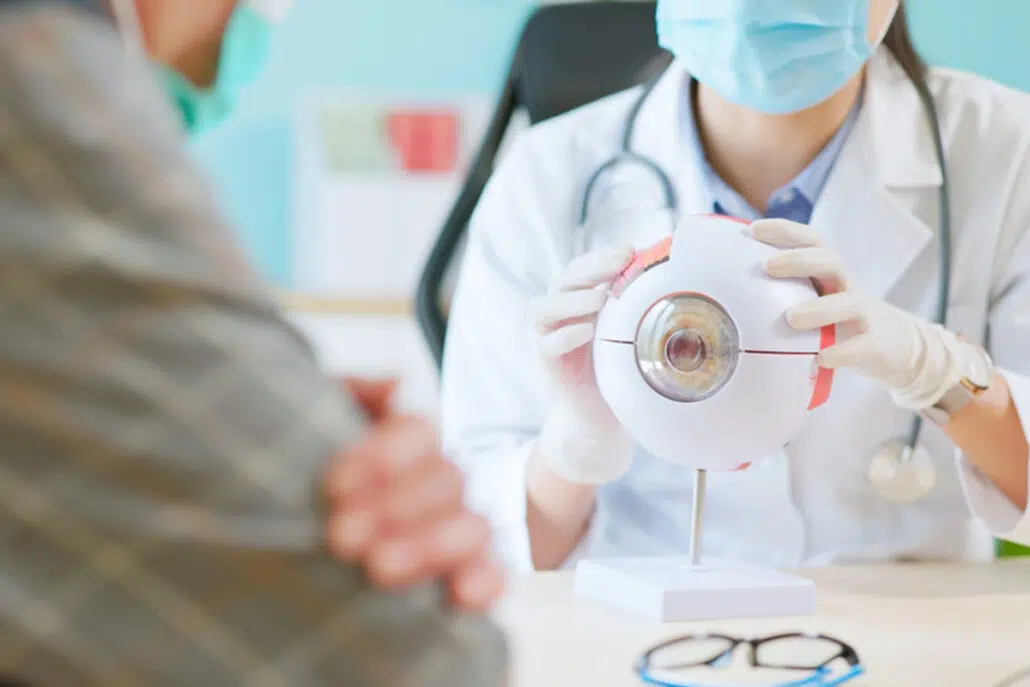Are your eyes feeling itchy, dry, and irritated? You may be suffering from allergic conjunctivitis. Allergic conjunctivitis can make your eyes feel uncomfortable and cause redness, swelling, or discharge. Thankfully, there are some strategies you can use to manage symptoms at home. In this blog post, we’ll outline the most effective remedies for managing allergic conjunctivitis symptoms at home. Get ready to enjoy clear, comfortable eyes again!

Understanding Allergic Conjunctivitis
Allergic conjunctivitis is a common eye condition triggered by an allergic reaction to substances like pollen, pet dander, and dust mites. This reaction involves mast cells in the lining of the eyes releasing inflammatory substances, leading to eye allergies. Understanding allergic conjunctivitis is crucial for managing it effectively at home.
Prevalence and Impact
Allergic conjunctivitis is a widespread condition, often accompanying other allergic symptoms like a runny nose or atopic dermatitis. It affects a significant portion of the population, especially those with a predisposition to allergic conditions. The impact on daily life can be substantial, ranging from minor irritation to significant discomfort, affecting vision and quality of life.
Identifying Allergic Conjunctivitis Symptoms
Common Signs and Symptoms
The common symptoms of allergic conjunctivitis include red, itchy, and swollen eyelids, often accompanied by watery discharges. Patients may also experience blurred vision, sensitivity to light, and a sensation of a foreign body in the eye. These symptoms can be similar to those of viral or bacterial conjunctivitis, making accurate identification important.
Differentiating from Other Eye Conditions
Differentiating allergic conjunctivitis from other forms of conjunctivitis, like viral or bacterial infection, is crucial. Viral conjunctivitis often accompanies the common cold, with more watery discharge and a viral infection history. In contrast, bacterial conjunctivitis is characterized by a thick, mucous discharge and is commonly associated with a bacterial infection. Allergic conjunctivitis typically involves both eyes and is closely linked to environmental allergen exposure.
Allergic Conjunctivitis Relief at Home
Lifestyle Modifications for Relief
Managing allergic conjunctivitis at home involves several lifestyle modifications. This includes reducing exposure to allergens such as pollen, pet dander, and dust mites. Using air conditioners and keeping windows closed during high pollen counts can significantly help. Regularly washing bedding in hot water to eliminate dust mites and minimizing exposure to pet dander are also effective strategies.
Home Remedies and Their Effectiveness
Home remedies can provide significant relief from allergic conjunctivitis symptoms. Cool compresses or ice packs applied to the closed eyelids can reduce swelling and irritation. Additionally, flushing the eyes with cold or warm water can help remove allergens and soothe the eyes. Over-the-counter antihistamine eye drops can also be beneficial in managing symptoms.

Practical Tips for Managing Allergic Conjunctivitis at Home
Environmental control and lifestyle adjustments are essential in reducing the frequency and severity of allergic conjunctivitis episodes. Here are some practical and effective tips for allergic conjunctivitis symptoms at home:
Environmental Control Strategies
- Minimize Exposure to Allergens: Keeping the home environment free from common allergens is crucial. Use dust-proof covers on bedding to prevent dust mite exposure. Regularly wash bed linens in hot water to eliminate allergens.
- Air Quality Improvement: Utilize air purifiers with HEPA filters to capture airborne allergens like pollen and animal dander. Ensure regular cleaning or replacement of filters to maintain effectiveness.
- Control Indoor Humidity: High humidity levels can encourage the growth of mold and dust mites. Use dehumidifiers to maintain a comfortable and healthy indoor humidity level.
- Pet Allergen Management: If pet dander is a trigger, consider keeping pets out of bedrooms and off upholstered furniture. Regularly grooming pets and using air purifiers can also help reduce pet dander in the home.
Diet and Nutrition Considerations
- Anti-inflammatory Foods: Incorporate foods rich in omega-3 fatty acids, like salmon, walnuts, and flaxseeds, which can help reduce inflammation. Fruits and vegetables, particularly those high in Vitamin C and E, can also support immune health.
- Hydration: Keeping well-hydrated helps in maintaining the natural tear film of the eyes, which can be beneficial in flushing out allergens and providing relief from irritation.
Personal Care and Hygiene
- Eye Hygiene: Wash your hands frequently to avoid transferring allergens to your eyes. If you wear contact lenses, ensure they are cleaned regularly, as lenses can accumulate allergens.
- Avoid Touching or Rubbing Eyes: This can exacerbate irritation and potentially introduce more allergens or infectious agents into the eye area.
Home Remedies
- Cool Compresses: Applying cool compresses to the eyes can help reduce swelling and itching. This can be done with clean, damp cloths or cooled gel eye masks.
- Saline Eye Washes: Regularly rinsing the eyes with saline solution can help remove allergens and soothe irritated eyes.
Over-the-Counter Solutions for Allergic Conjunctivitis Relief
Safe Use of OTC Medications
Over-the-counter medications, like oral antihistamines and mast cell stabilizers, can be effective in managing allergic conjunctivitis symptoms. It’s important to follow dosage instructions and be aware of potential side effects. Consult with a healthcare provider before starting any new medication, especially for long-term use.
Complementary Therapies and Supplements
In addition to medications, certain supplements and complementary therapies can be beneficial. Omega-3 supplements, for example, have been shown to support eye health. Herbal remedies, such as chamomile tea compresses, can also provide soothing relief, though it’s important to ensure there’s no allergic reaction to these remedies.
When to Seek Expert Help for Allergic Conjunctivitis Symptoms
Recognizing Red Flags
Certain symptoms indicate the need to consult a health care provider. These include severe pain, vision loss, or symptoms that persist despite home management. If symptoms worsen or do not improve with home treatment, it’s crucial to seek medical advice.
Consulting Healthcare Professionals
Consult with an eye specialist or allergy specialist if symptoms persist or in cases of severe allergic conjunctivitis. Professional guidance is essential in such cases to prevent complications and receive appropriate medical treatment.

If you’re looking for professional advice and support in managing your allergic conjunctivitis symptoms, reach out to the experts at Becker ENT & Allergy. With their comprehensive approach to diagnosis and treatment, they can help you find relief from your allergic conjunctivitis symptoms.
Conclusion
Allergic conjunctivitis is a common yet manageable condition. With the right knowledge and home-based strategies, most individuals can effectively control their symptoms. However, it’s crucial to recognize when professional medical advice is needed. By understanding the triggers, symptoms, and effective home remedies, you can greatly reduce the impact of allergic conjunctivitis on your daily life. Remember, consistent care and being mindful of allergen exposure are key to managing this condition effectively at home.

